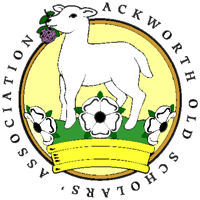President 2012-2013 : Stephen and Joyzelle Kelsall
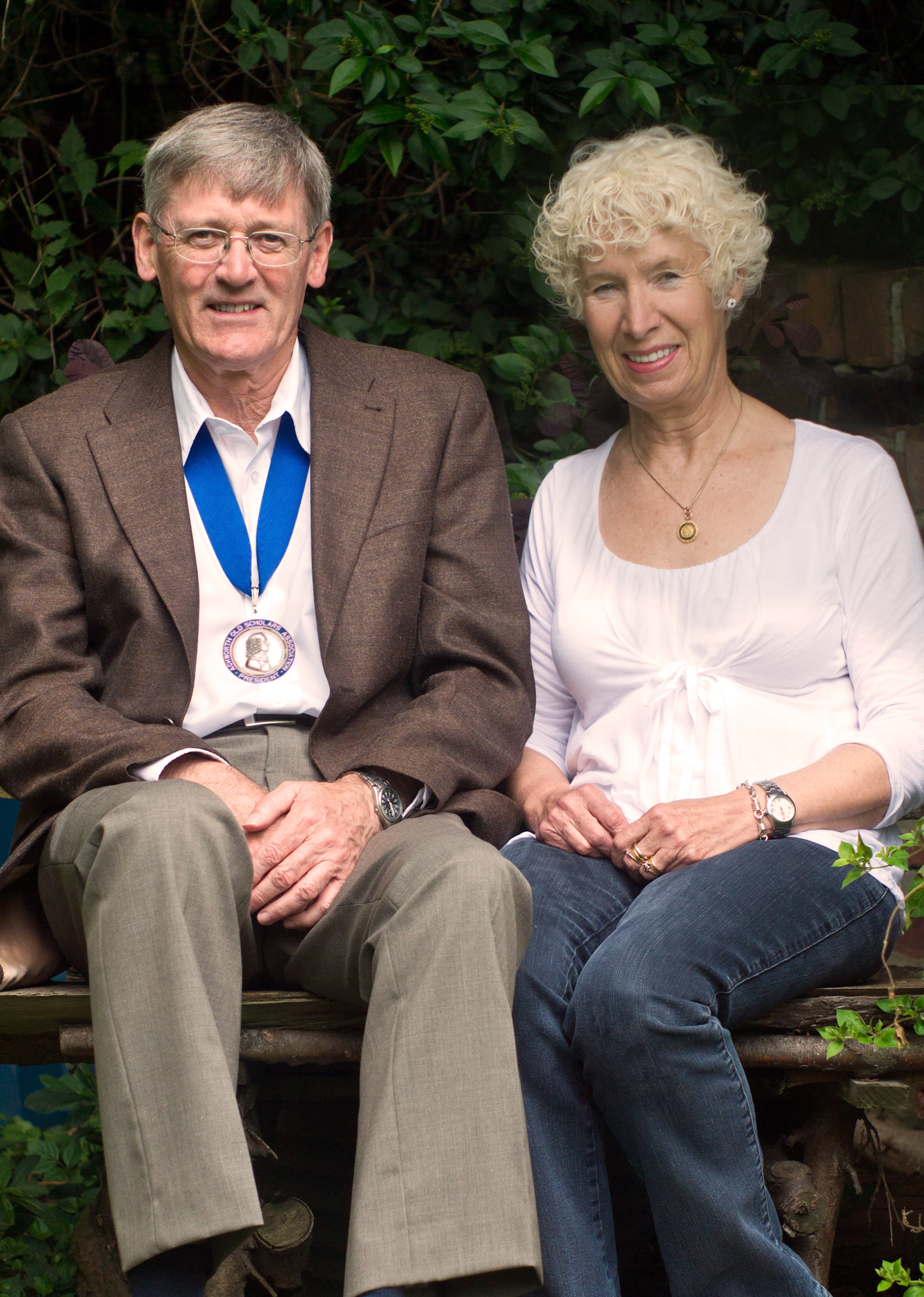
Stephen Kelsall comes from a family which has been farming in the valley between Lancaster and the Trough of Bowland since the seventeenth century. Its roots in Quakerism and Methodism go back as far and the family diaries give an account of one of his ancestors being sent to Ackworth in 1821.
Joyzelle’s (nee Lloyd) parents converted from Methodism to Quakerism before the war and her father was a conscientious objector, sent to work on the land. After the war, both parents worked in residential child care, the rather odd home life made her parents feel it would be good to send her to Ackworth and she began in 1954.
Stephen’s strengths were mainly on the science side, culminating in Maths, Physics and Chemistry for A level. His hobbies were photography and aero-modelling, and he was also keen on sport, particularly cricket, becoming First Eleven captain in his final year. Joyzelle was only interested in the Arts, was not good at sport, except swimming and most of all enjoyed singing. What an unlikely pair!
Their relationship began in the Lower Sixth, when Stephen asked Joyzelle to go on the Founder’s Day walk with him and they were married in 1965, at Lancaster Meeting House, at the age of 21. Joyzelle was an hour and a half late for the ceremony, because the wedding car went to the wrong house. This was in the days before the convenience of mobile phones!
They began their married life in Manchester where they have lived ever since.
Stephen spent most of his working life with an advertising agency, becoming a Director in 1980. He enjoyed the variety of working on different accounts and his science background came in very useful in the later years of his career, when he was in the agency’s healthcare division, with clients such as AstraZeneca and Sanofi. He was involved in different branches of medicine, preparing research and technical information about drugs for kidney failure, hypertension, breast and prostate cancer, amongst others. He was one of the few people in the agency who could understand both clinicians and the chemists!
After Durham University, Joyzelle went straight into teaching in a Girls’ Grammar School. At first teaching English followed much the same pattern as her own education, but within two years the comprehensive system was brought in, and a new approach to the subject came with it. The teaching of grammar was virtually swept away, and teachers were encouraged to concentrate their lessons on creative writing and self-expression, with much less attention to sentence construction, spelling and punctuation - an idealistic approach, but not without long-term problems.
Change after change followed, with too many exam formats being tried out for a couple of years, before being abandoned for something else. The comprehensive schools which had most chance of success were those which began in new purpose-built premises, but many schools had to manage on split sites.
After her first job in the Grammar School, Joyzelle then worked in several Comprehensive schools and when another restructuring brought about the introduction of Sixth Form colleges, she moved to a newly-formed Roman Catholic Sixth Form College, where she taught until retirement.
Some of our interests have remained constant. Stephen is very involved in golf, having been captain of his club, and for ten years, the director responsible for the course. He is still keen on photography and plays a lot of Bridge. Joyzelle sings in two choirs and is Chair of a large gardening society whose profits support our local park. She did, surprisingly, take up ice-skating, tennis and yoga in middle age and actually enjoyed them! However, swimming is the only sport that has lasted and most days begin with a kilometre swim at a local health club.
They cannot say that they have brought up our two children according to overtly religious principles, but they are glad that both have chosen to work in spheres which are morally worthwhile and which benefit society.
Tim studied PPE at Oxford, then specialised in African Politics for his Ph.D. and went onto become a lecturer at Newcastle University for six years. His wife, whom he met while they were observing the trials in Sierra Leone, is a Human Rights lawyer. She is currently employed by the UN, monitoring the Khmer Rouge trials in Phnom Penh. From the family base in Cambodia, Tim flies to Africa, working in several countries on various research and development projects sponsored by the Department for International Development (DFID).
Their daughter, Eleanor, went to UCL, and now is in charge of fund-raising for a charity which helps people to overcome drug and alcohol addiction.
They have a grandson and a granddaughter and by the time of the Easter Gathering, hope to have another grandson.
President 2011-2012 : Shirley Day
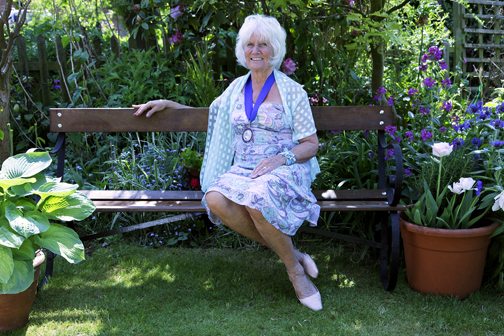
Shirley was born to Tom and Molly Rogers on Sunday, January 19th 1936, when the snow lay thick on the ground, with more falling fast. The church bells were ringing as midwife and doctor, just in time, struggled through the snow to make the home delivery. Shirley still loves the snow, in spite of having been missing off a crowded sledge when it reached the bottom of a long hill, when a year old. Fortunately she landed face up and was found laughing. The day following her birth, half the world was plunged into mourning upon the death of King George the Fifth. 1936 is unique in British history, having three reigning monarchs, George V, Edward VIII and George VI.
Tom Rogers was Head Gardener at Hackness Hall in North Yorkshire, to Lord and Lady Derwent. Tom’s occupation meant that the family lived in beautiful rural settings. Indeed, when Shirley went for an exploratory walk with Tom, who became Head Gardner at Ackworth School in 1947, she arrived back home to report that Ackworth was nearly a town with lots of schools, pubs and shops, including a fish and chip shop!
With older sister Peggy, Shirley attended Ackworth School, followed later by their brother Malcolm. Her parents spent the rest of their lives at Ackworth so it is an essential part of Shirley’s life.
After leaving school at the end of her fifth year, Shirley moved to Leeds to train as a nursery nurse; from the beginning she was most unhappy and ill at ease. After three months she returned home and soon joined the West Riding Treasurer’s Department at Wakefield County Hall where she trained as a Hollerith Machine Operator, the fore runner of computers. This she enjoyed but four years later went to work for the Metropolitan Water Board in London. It was here, that by chance, she decided to join the West Riding Police. A strange new world but one that Shirley found fulfilling and it certainly broadened her experiences of and values in life. People within a small community lead vastly differing lives even though most conform and unite.
In the sixties Shirley transferred to the Wiltshire Constabulary, becoming sergeant. Policing in Wiltshire was very different as in the West Riding policewomen were tough and operated the same as the men, whereas in Wiltshire, policewomen worked mainly with women and children.
In 1970 Shirley returned to South Yorkshire and became a school matron in a comprehensive school; this resulted in her going to teacher training college in Doncaster. It was here that she met her husband Walter and after a whirlwind romance, daughter Laurie was born. They spent more than twenty idyllic years in the Head Gardner’s old house at Frickley Hall, where Ackworth Meeting and Old Scholars visited.
Having studied music and drama at College, Shirley chose to teach children who in present day terms have special needs. This gave her great success in teaching but not ambition. Most of her years in Doncaster were spent teaching children with special learning difficulties. A job she thoroughly enjoyed.
Upon retiring from full time teaching in 1993, Shirley continued to teach part time on supply and found this invigorating. This led to her teaching in a behaviour unit, a new challenge, and vastly different from any previous teaching; full of difficulties, frustration, disappointment and pin points of special minutes which gave joy and a brief sudden glow before fate or expectations often blew them away. A positive belief was a major part of this work. Shirley worked part time until retiring at seventy four.
Shirley and Walter live now in a pretty country cottage in a very small community where Shirley quickly became President of the W.I., Chairman of the Parish Meeting, no one else being fool enough. She is an active member of the Book Club, Poetry Group, two Dance Groups, History Group and she teaches a Movement and Music Group. With one husband, along with a loving daughter, Laurie and son in law Jason, two dogs, three cats, a garden, coal fires and boiler and many many friends, including AOS, life is full indeed.
President 2010-2011 : Martin Dickinson
A Message from the President
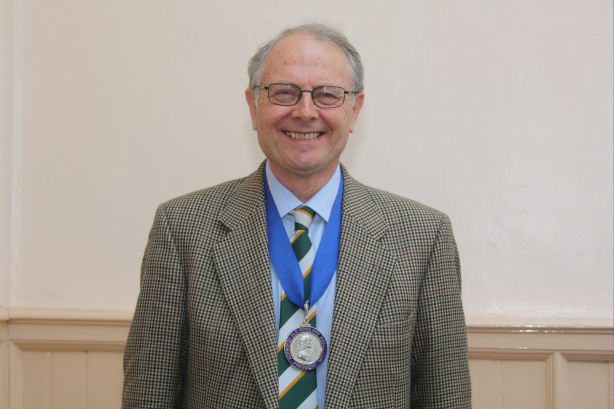
I was Head of Ackworth School between 1995 and 2004 and both Susan and I found this the happiest of times. The job of Head was demanding but at the same time immensely varied and stimulating. The school has a very special atmosphere reflecting the Quaker faith which has been at the heart of the school from its foundation and affects all who live and work here and which seems to permeate the very stones of the school’ beautiful buildings.
Our first Easter Gathering was in 1995, just a few weeks before I took up the reins as Head on 1 June. Susan and I were overwhelmed by the warmth of the welcome we received and from that moment on we felt that Old Scholars were a real source of strength and support, both as individuals and collectively. Easter Gatherings were, and are, a delight and indeed wherever Old Scholars gather I feel at home. I shall always look back on my Ackworth years with affection and gratitude. It was an immense privilege to be Head. I am delighted to take up the role of President of the Ackworth Old Scholars’ Association and Susan and I look forward to meeting many of you during my year in office, including, I hope, some of those I knew as scholars in the School.
President 2009-2010 : Donald Elliott
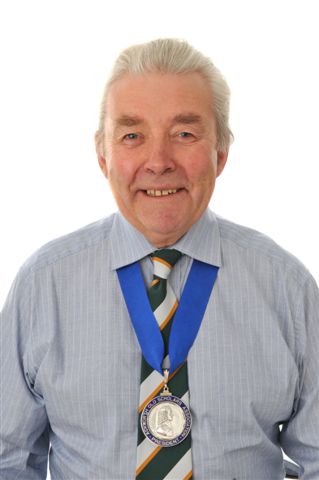
Donald was born in 1940 on the outskirts of Sheffield to Laurence and Kathleen; neither of whom was linked with the Quakers until the family, including three younger sisters and grandmother, moved to Scarborough ten years later. It was here that Laurence discovered the Meeting House, having lost his way en route to another place of worship; he remained committed to the Quakers for the rest of his life.
After two years at the local boys’ grammar he transferred into the third form at Ackworth in 1953, studied French, German and Spanish to Advanced Level, followed by a Spanish and French degree at Sheffield University. After a Postgraduate Certificate in Education he spent a year as a foreign language assistant near Trier, Germany where he met and married Ute. They had two children, Michael and Sally.
On his return to the UK he was fortunate in his first post to teach all three languages at Hyde Grammar, followed by a short spell at Stretford Grammar. During these years he was much involved in looking after the first Xl soccer teams at both schools.
Seeking a new challenge after nine years teaching very able boys he was appointed head of department of modern languages at Myers Grove, the first comprehensive in Sheffield with a number on roll of 2300 pupils. It was indeed a baptism of fire with too many of his early charges disenchanted with the learning of a foreign language.
After eight years, during which time pupils opting for languages had increased both pre-and post 1 6, his career took a different path when he was appointed to the Department of Education and Science as Her Majesty’s Inspector of Schools. He was initially based in the Sheffield Office with pastoral responsibility for all types of schools in South Humberside and Rotherham but a much wider brief for modern languages in the Northern Division.
A transfer to the North West, based in Preston, followed in 1983. Secondary school inspections throughout England and regular visits to primary schools in Lancashire were the norm. Directing language enrichment courses abroad for UK foreign language teachers occurred annually during the next ten years until the Secretary of State drastically reduced the number of HMI; those over the age of 50, like himself, were encouraged to take early retirement. He has since continued to work as an educational consultant, latterly as an assessor for schools applying for Specialist Schools’ status and also as a monitor of the work of foreign nationals on the Graduate Teacher Programme who seek Qualified Teacher Status.
Since 1993 his involvement as a member of School Committee and as clerk to the Education Sub-Committee has ensured regular contact with the school. It has been a privilege to observe and contribute to the continuing success of Ackworth for so long.
A passionate interest in tennis has led to work for the Lawn Tennis Association, initially as a coach, and later as a referee at junior and senior tournaments in the north. His current involvement remains twice weekly games of doubles and annual visits to major tournaments in Europe. Retirement beckons with further plans for travel at home and abroad.
Donald hopes to see as many of you as possible at Easter 2010.
President 2008-2009 : Christopher Rengert
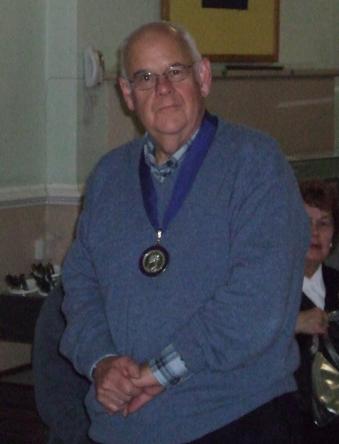
Chris was born on 14th January 1939, the only child of Reg and Hetty. Home until age ten was Hampton-on-Thames. Chris is one of the quite small age group old enough to have vivid recollections of wartime life but no knowledge of pre-war times. Young childhood was full of references to marvellous things which you couldn’t have because of the war and most of which when eventually encountered left him wondering what the fuss was about! Primary education was at a marvellous small independent school in Hampton. There was a short break in 1944 when Chris and his mother sought refuge from doodlebugs in Oswaldtwistle in Lancashire.
At age ten the family moved to Southend-on-Sea, to be closer to various grandparents, and Chris spent one year at a large state primary school in Southend. After two years of French and one year of Latin, a year spent seemingly only training for the eleven plus seemed to Chris an educational regression.
Ackworth arrived in Chris’s life in a fairly unconventional way. His mother was for several years seriously ill, and Southend ran a scheme for part funding boarding education for supposedly deserving cases. The panel of schools consisted of Felsted, Dulwich and Ackworth. Chris’s mother knew of Ackworth and this led to an interview with Kathleen Cottrell, acceptance and arrival at Ackworth in September 1950.
In 1955 Southend Council abolished the policy and so ended five very happy years with a reasonable clutch of O levels. The choice of ongoing sixth form at Southend High School was forestalled by a trial period of work in a small City firm of chartered accountants. Chris stayed on for five years’ articles and qualified in 1961, missing national service by fourteen days. A totally unplanned career took him through four years at Thomson McLintock, then a smaller national firm, four years at Courtaulds and then back to the profession as a senior audit manager at Touche Ross, then a burgeoning international firm. This was followed by several years as audit partner of medium sized West End firm. In 1980, in complete contradiction to his previous life he dropped out of large firm life and set up as a sole practitioner working from home. He is still there!
Running a very long audit assignment in Norwich in 1962 Chris met Sheilah, then working as a health visitor in Great Yarmouth. They married the following year, and Belinda was born in 1965. Their first home was in Thaxted in north Essex, and apart from a short break, they have lived in the same village ever since.
Belinda followed Chris to Ackworth in 1975, culminating in her being head girl in 1981, leading to Nottingham University, law school and a very successful career as a solicitor. Belinda married Geoff, an Australian, and Chris and Sheilah’s grandson Benjamin was born in 1998.
Since Belinda’s arrival at Ackworth, neither Chris nor Sheilah have been able to get away from it. Chris was treasurer of AOSA from 1989 until quite recently, and a member of School Committee for two spells, the second as treasurer for eight years. Belinda was an Easter Secretary for many years and also served on School Committee. Sheilah, perhaps thinking “if you can’t beat them, join them” was the AOSA executive committee’s secretary for some years.
Chris keeps trying to retire, but has not so far succeeded. Sheilah has a fast developing new career in providing expert witness reports in cases involving nursing care of elderly people, and has been associated for several years with an advisory group for the Royal College of Physicians.
Chris and Sheilah hope to see as many of you as possible at Easter 2009.
President 2007-2008 : Diana Chadwick
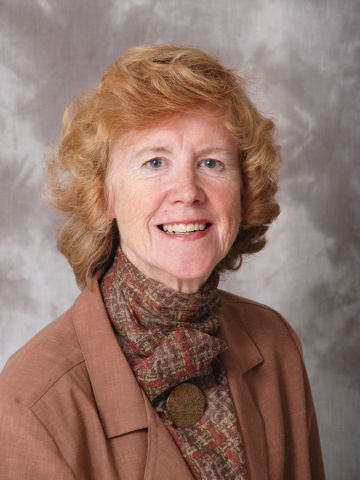
The AOSA President 2007 to 2008 is Diana Chadwick.
The following has been taken from the 2007 AOSA Annual Report:
Diana spent eleven years at Ackworth as Deputy Head having previously been Deputy Head of Devizes School in Wiltshire. Her earlier teaching posts were held in grammar and comprehensive schools in Kent, Derbyshire and Sheffield so coincided with a period of considerable educational change at secondary level. Her increasing contact with Friends over the years and her sympathy with their basic philosophy mean that Ackworth, which she joined in 1986, present an especially interesting challenge.
Her own school education took place in the 1940s and 1950s in south-west Sheffield, a city to which her parents had moved just before she was born. Abbeydale Girls’ Grammar School with its cohort of well-qualified staff and fine facilities provided ample stimulus for energetic and curious youngsters. The local area, adjacent to the Peak District, undoubtedly contributed significantly to her great interest in landscape and the many influences that affect it.
Later studies took her to the University of Hull to read for a degree in Geography specialising in Geomorphology (including past climatic changes!) and to the University of Reading where the Education Department was headed by the well-known Quaker, Professor Charles Dobinson. It was in Reading that she first encountered the boys of Leighton Park School attending the local Quaker Meeting, as well as other Friends.
Teaching Geography in Grammar Schools dominated the sixties and the subject was popular at all levels. By 1970, within a Sheffield School that was becoming comprehensive, she was also involved in management as a Head of House, devoting much time to the integration of local thalidomide youngsters and to pupils who had recently settled into the city from overseas. It was during this period that, appalled at the loss of so much of the region’s architectural heritage, she helped to establish the Hallamshire Historic Buildings Society and learned much about campaigning in the process.
Devizes School in Wiltshire brought a wider range of management responsibilities in a setting that required the integration of two groups of pupils and two groups of staff. Pupils’ awareness of places north of the M4 was limited so Diana soon realised she owed it to them to extend their field studies. At Devizes she worked closely with three Heads (as she did at Ackworth) and learned to cope with some interesting situations, including major emergencies, in both locations. She is not convinced that large secondary schools really fulfil youngsters’ essential needs; those the size of Ackworth, given adequate resources, may well achieve considerably more in aiding their development and maturity.
She valued the outlook of youngsters whose growing awareness of others’ needs – whether in medical, social, animal welfare or environmental matters – was so apparent at Ackworth. Since retirement Diana has had more opportunity to pursue her special interests in health services (she is a governor of Sheffield Hospitals’ Foundation Trust) , farm animal welfare, vernacular architecture, music and gardening. Attractive Derbyshire walks beckon daily.
She very much hopes to see many former pupils and staff over Easter 2008.
Previous Presidents
President 2006-2007 : David Bunney
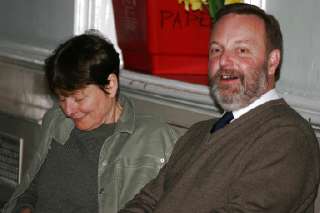
David Bunney was born on 18th April 1952 at Burton on Trent General Hospital, the eldest child of John W. (scholar 1934-39) and Margery, nee Wilson (scholar 1941-45, President 1997-8). After an upbringing on the family market garden 10 miles east of Birmingham David went to Ackworth in September 1963, continuing the family connection by following Uncle George (President 1986-7) and three aunts, Elizabeth, Margaret (nee Scaife) and Helen. His grandmother Helen M. Bunney also served on the School Committee.
Andrew (1967-74) and Catherine(1973-7) followed David to Ackworth. He became a day scholar when Andrew entered school and Margery joined the staff as Domestic Bursar.
In his time at Ackworth (1963-70) David had an undistinguished academic career but enjoyed the sporting opportunities. After Ackworth David attended Whitwood Mining & Technical College in Castleford, concentrating on Business Studies and some A levels rather than mining! As one of the older students he did achieve some academic success prior to attending Sheffield Polytechnic, again with Business Studies. It was during this period from 1972-76 that David first encountered the heavy engineering industry. One academic year and holidays were spent at the River Don Works of British Steel in Sheffield and David has worked there almost ever since!
He started full time employment as a graduate trainee in August 1976 in the forging sales department, not the forgery department as some have described it! Since then he has seen privatisation, booms and slumps, mergers, continual job losses and faced a lot of challenges. There has also been some fun. He left what became Sheffield Forgemasters in 1986. David spent 3 ½ years at Walter Somers, a forging company in Halesowen on the edge of the Black Country and nearly back to Midlands roots. It was good to see what a profitable company was like from the inside!
Tina and David were married in York on 12th April 1982 having met on a skiing trip to Spain. Theirs was the second Bunney wedding involving Mount staff, (after Andrew and Frederique) Tina being Head of PE. David and Tina lived in York for 8 years during which time Nick was born in May 1984 and Simon in April 1986. The family moved to Ackworth in April 1990 when David returned to Sheffield Forgemasters. He is now a senior sales manager responsible for international sales for a group of products and he has been fortunate enough to visit on a regular basis to Europe, USA, Brazil, China and Japan.
Sport has played a big part in the family life. David has played hockey every season since 1970, mainly for Wakefield but also for York, Yorkshire and the Yorkshire Veterans having been captain of several teams. As the boys grew so the playing career seemed to extend with the addition of cricket in summer. David has really enjoyed playing alongside Nick and Simon and then watching them go to higher levels.
Retirement is not an immediate prospect!
President 2005-2006 : Geoff Pedlar
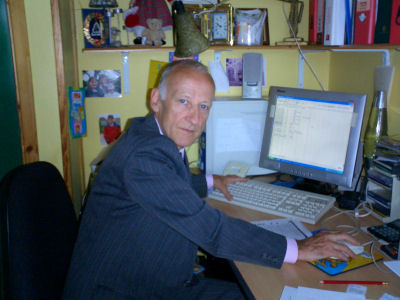
Where to start, that is the most difficult part, especially when you are not too good with this "I" word. Nevertheless tradition (actually only from 1976, previous to then presidents' past exploits were apparently shrouded in a cloak of secrecy !) dictates that I must tow the line. Well actually, it's the editor bullying me !
Born during the war (so long ago that it is now taught as part of history, so I had better say "born during the second world war") I was brought up in a period of serious, if not extreme, scarcity, making thrift very much the order of the day. A personal quality that has stood me in good stead for much of my life.
Life at Ackworth School in the 1950s was not a hardship in the way that it must have been in the 1700s & 1800s. Nevertheless it was a great deal harder than today; an unsatisfactory situation measured by today's standards, although ironically it developed in many of us a range of personal qualities sadly uncommon today.
Indeed, in spite of, or perhaps because of, these circumstances I enjoyed my time at the school, having mounted obstacles and met challenges (more of that in my address at Easter) and succeeded in leaving my name in (and on) several annals of the school's history, mostly sporting.
So what to do next now became the great quandary. Here I can identify with modern youth; I could go to Uni so I might as well make that the next thing. What I wanted to study, space engineering (yes, in those days this country really did have a space industry), simply wasn't available at Uni. So, without any careers advice available to guide me to go directly in to industry, I went to Glasgow to study aeronautical engineering (the nearest substitute), didn't like that so switched to metallurgy at Sheffield.
Then eventually I could no longer escape the real world. I remember the job advert clearly "are you a round peg in a square hole ?". Well, I guess most of my contemporaries would answer "yes" to that question, we were a bizarre bunch. Much to my surprise it got me onto the bottom rung of BT's management ladder, with whom over the next 18 years I learnt most of my organisational and business skills.
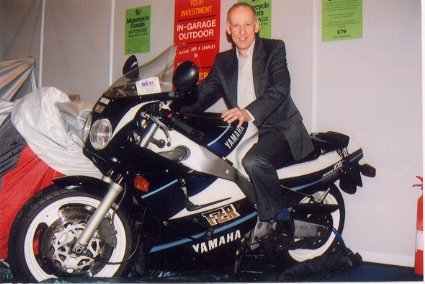
That kept the "roof over our heads" whilst I indulged myself in typical male activities of sport and motorcycling. I did pretty well at hockey, played squash too; and became involved in the running of the motorcycle club I had joined. That took me to many European countries including those "behind the iron curtain" except Russia (several of which we are now partners with in the EU. What an enormous change of regime that is).
During this period I married and we had two sons Daren & Ashley, both of whom are now with partners. Daren now has children of his own, so I am also a proud grandfather to Stacey & Jamie.
Life after BT was rather different, to say the least. From one of the largest corporations in Europe at that time to a one man band, you can't get a much more dramatic work change than that. So now this really is survival of the fittest; will all that resolve gained at school come in to play again ?
Just what does a one man band do ? Well, not a lot if you can help it ! Otherwise, run your own management and business consultancy (some would say unkindly that amounts to the same thing).
Finally we get to the third career, still taking place (ideas for a fourth career gratefully received !). All I wanted was a decent cover for my very nice, and by then quite old, car. So when I was unable to find anything that I thought had the right quality and was available at the right price, I decided that I couldn't be much in the way of a business consultant if I couldn't get a business going to meet that need; others must surely want the same ! Well it so happens that they did, and still do.
It seems that resolve has paid off again; 15 years later & I've created jobs for 10 people, and we make covers for anything from 3 wheel Morgans & double deck buses to motorbikes to aeroplanes; plus a variety of industrial uses.
That's it; see you at Easter.
